Table of Contents
UPSC Philosophy Syllabus
Philosophy is one of 48 subjects available on the UPSC optional subject list. The Philosophy syllabus for the IAS exam focuses on candidates’ ability to comprehend the subject and apply their knowledge to Indian society. This subject includes topics on the history and evolution of philosophy, religion, and social structures.
Candidates who opt for Philosophy as an optional subject in the UPSC will find that the syllabus focuses on issues and topics related to the history and evolution of philosophy, as well as its impact on Indian culture. This article contains the detailed UPSC Syllabus for Philosophy Optional as well as the UPSC Philosophy Optional Syllabus PDF.
UPSC Philosophy Optional Syllabus 2023
In UPSC Mains 2023, Philosophy Optional Subject has two papers (paper I and paper II). Each paper carries 250 marks, for a total of 500 marks. After passing the IAS Prelims, candidates must sit for the UPSC Mains, which consists of nine subjective papers.
UPSC Philosophy Syllabus Paper 1
Paper 1 of the UPSC Philosophy Syllabus majorly talks about the History and Problems of Philosophy which is further divided into the subtopics such as Plato and Aristotle, Rationalism, Empiricism, Kant, Hegel, Logical Positivism and so on. Get the details of each topic below:
History and Problems of Philosophy
1.Plato and Aristotle: Ideas; Substance; Form and Matter; Causation; Actuality and Potentiality.
2.Rationalism (Descartes, Spinoza, Leibniz); Cartesian Method and Certain Knowledge; Substance; God; Mind-Body Dualism; Determinism and Freedom.
3. Empiricism (Locke, Berkeley, Hume): Theory of Knowledge; Substance and Qualities; Self and God; Scepticism.
4. Kant: Possibility of Synthetic a priori Judgments; Space and Time; Categories; Ideas of Reason; Antinomies; Critique of Proofs for the Existence of God.
5. Hegel: Dialectical Method; Absolute Idealism.
6. Moore, Russell and Early Wittgenstein: Defence of Commonsense; Refutation of Idealism; Logical Atomism; Logical Constructions; Incomplete Symbols; Picture Theory of Meaning; Sying and Showing.
7. Logical Positivism: Verification Theory of Meaning; Rejection of Metaphysics; Linguistic Theory of Necessary Propositions.
8. Later Wittgenstein: Meaning and Use; Language-games; Critique of Private Language.
9. Phenomenology (Husserl): Method; Theory of Essences; Avoidance of Psychologism.
10. Existentialism (Kierkegaard, Sarte, Heidegger): Existence and Essence; Choice, Responsibility and Authentic Existence; Being-in-the-world and Temporality.
11. Quine and Strawson: Critique of Empiricism; Theory of Basic Particulars and Persons.
12. Carvaka: Theory of Knowledge; Rejection of Transcendent Entities.
13. Jainism: Theory of Reality; Saptabhanginaya; Bondage and Liberation.
14. Schools of Buddhism: Prat Ityasamutpada; Ksanikavada, Nairatmyavada.
15.Nyaya—Vaiesesika: Theory of Categories; Theory of Appearance; Theory of Pramana; Self, Liberation; God; Proofs for the Existence of God; Theory of Causation; Atomistic Theory of Creation.
16.Samkhya; Prakrit; Purusa; Causation; Liberation.
17.Yoga; Citta; Cittavrtti; Klesas; Samadhi; Kaivalya.
18. Mimamsa: Theory of Knowledge.
19.Schools of Vedanta: Brahman; Isvara; Atman; Jiva; Jagat; Maya; Avida; Adhyasa; Moksa; Aprthaksiddhi; Pancavidhabheda.
20. Aurobindo: Evolution, Involution; Integral Yoga.
UPSC Philosophy Optional Syllabus Paper 1 PDF
Paper 1 of the UPSC Philosophy majorly talks about the History and Problems of Philosophy which is further divided into the subtopics such as Plato and Aristotle, Rationalism, Empiricism, Kant, Hegel, Logical Positivism and so on. Get the details of each topic in the below PDF:
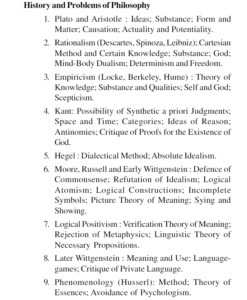
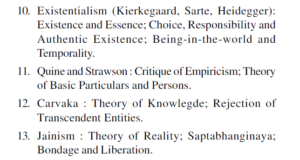
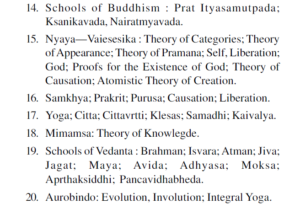
UPSC Philosophy Syllabus Paper 2
The syllabus for paper 2 of the Philosophy is comprised of Socio-Political Philosophy &Philosophy of Religion. Get the detailed syllabus below:
Socio-Political Philosophy
- Social and Political ideals: Equality, Justice, Liberty.
- Sovereignty: Austin, Bodin, Laski, Kautilya.
- Individual and State: Rights; Duties and Accountability.
- Forms of Government: Monarchy; Theocracy and Democracy.
- Political Ideologies: Anarchism, Marxism and Socialism.
- Humanism; Secularism; Multi-culturalism.
- Crime and Punishment: Corruption, Mass Violence, Genocide, Capital Punishment.
- Development and Social Progress.
- Gender Discrimination: Female Foeticide, Land and Property Rights; Empowerment.
- Caste Discrimination: Gandhi and Ambedkar.
Philosophy of Religion
- Notions of God: Attributes; Relation to Man and the World. (Indian and Western).
- Proofs for the Existence of God and their Critique (Indian and Western).
- The problem of Evil.
- Soul: Immortality; Rebirth and Liberation.
- Reason, Revelation, and Faith.
- Religious Experience: Nature and Object (Indian and Western).
- Religion without God.
- Religion and Morality.
- Religious Pluralism and the Problem of Absolute Truth.
- Nature of Religious Language: Analogical and Symbolic; Cognitivist and Non-cognitive.
UPSC Philosophy Optional Syllabus Paper 2 PDF
The syllabus for paper 2 of the Philosophy is comprised of Socio-Political PhilosophyPhilosophy of Religion. Get the detailed syllabus in the PDF below:
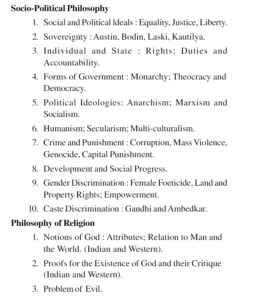
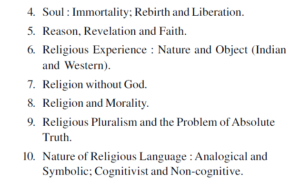
If you have chosen Philosophy as an optional for the UPSC Mains, you should prepare thoroughly by studying previous years’ papers and reading relevant books on Philosophy for UPSC. Because the syllabus of both exams overlaps, IAS aspirants can combine their preparation for Philosophy optional with their preparation for General Studies in Mains.

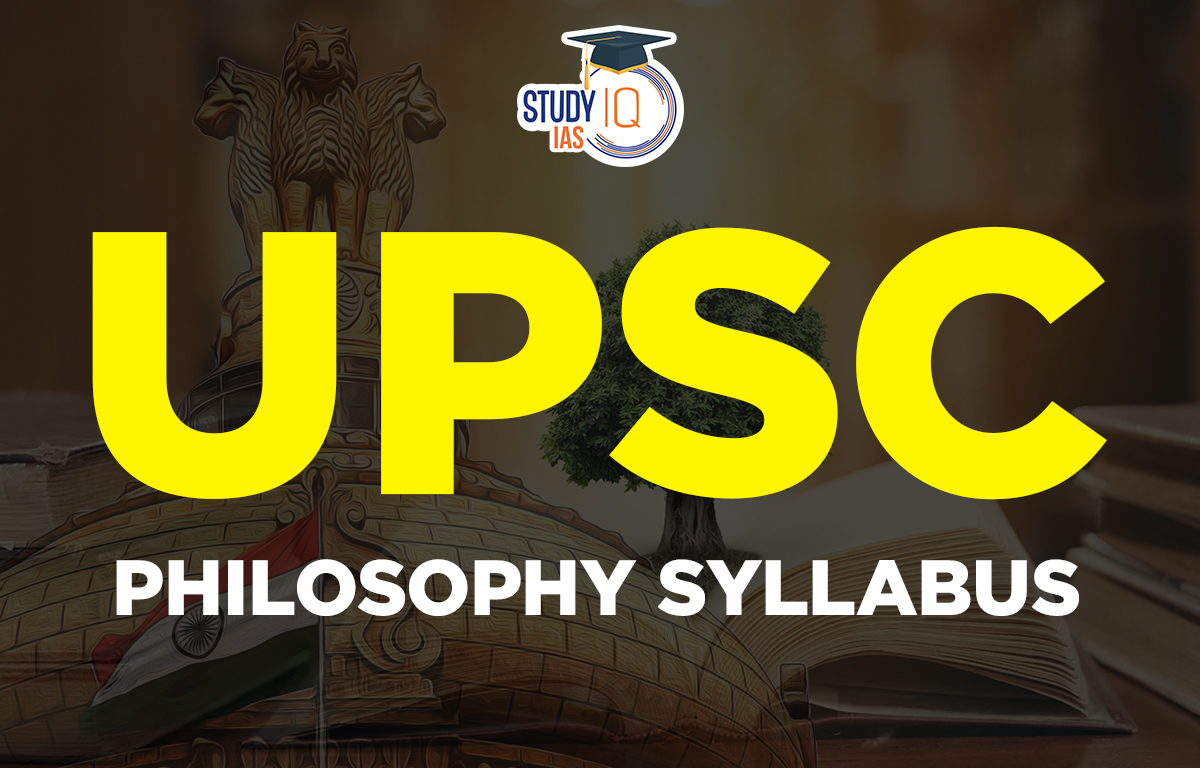
 Jumping Genes: The Revolutionary Discove...
Jumping Genes: The Revolutionary Discove...
 Nitrofurans: Understanding This Class of...
Nitrofurans: Understanding This Class of...

























